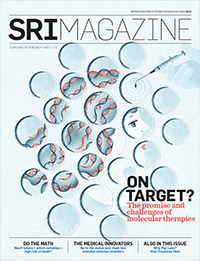News
Scientists at Sunnybrook Research Institute (SRI), working with neurosurgeons at Sunnybrook, have completed Canada’s first clinical trial to evaluate the use of high-intensity focused ultrasound (HIFU) to treat essential tremor. Results from the study’s six patients were excellent. Patients unable to raise a cup to their lips or sign their name legibly have been able to do both these tasks, and many more that were outside their grasp, after treatment.
The noninvasive technology was invented by Dr. Kullervo Hynynen, director of Physical Sciences at SRI, and developed in collaboration with InSightec, which commercialized it. The dome-shaped device directs ultrasound beams through the skull to target lesions inside the brain that cause essential tremor. Magnetic resonance imaging guides the procedure. Inside the skull, the beams converge with millimetre precision to heat the lesions, ablating them while sparing healthy tissue.
Essential tremor is the most common movement disorder. It affects about 3% of the population, or 1 million Canadians; of these, 30% don’t respond to medication and must have surgery. Compared with other options, HIFU, an outpatient procedure during which the patient needs no anesthesia, has less risk of infection, blood clot formation and damage to surrounding tissue—and no ionizing radiation. The trial, funded by the Focused Ultrasound Surgery Foundation, was led by neurosurgeon Dr. Michael Schwartz. Plans for a multi-institutional trial are underway.
Canada’s First Centre for Research in Image-Guided Therapeutics Opens
Sunnybrook Research Institute (SRI) officially launched the Centre for Research in Image-Guided Therapeutics, CeRIGT, on Nov. 2, 2012. Governor General David Johnston delighted a standing-room-only crowd as the guest of honour.
To celebrate, SRI opened the doors of its $160-million centre, giving invited guests and the public a rare glimpse of its state-of-the-art medical research facilities, some of which can’t be found in any other hospital in Canada. At roughly 150,000 square feet, CeRIGT is a two-floor expansion of the hospital’s main wing, with additional labs located in other wings.
More than 50 activities were set up across 16 labs. Visitors interacted with research staff, doing various hands-on tasks, like purifying proteins, taking brain tests and learning about the advances that will become tomorrow’s care. Scientists and clinicians at CeRIGT are working together to develop new and better ways to detect, diagnose and treat some of the most complex health conditions, including cancer, heart disease, musculoskeletal disorders, immune deficiencies, stroke and dementia.
In 2008, the Canada Foundation for Innovation announced that SRI was one of only eight institutions in the country to be successful in its bid for a Research Hospital Fund award. Dr. Barry McLellan, president and CEO of Sunnybrook, and Dr. Michael Julius, vice-president of research at Sunnybrook and SRI, presented a plaque to Dr. Gilles Patry, president and CEO of the Canada Foundation for Innovation, to thank the agency for its establishing $75-million investment. Other support comes from federal and provincial funding partners, industry contributions and donations.
To learn more about CeRIGT, visit sunnybrook.ca/research/cerigt.





Photos: Doug Nicholson
Union With Rehab Research Powerhouse
On July 1, 2012, Sunnybrook Health Sciences Centre merged with St. John’s Rehab to establish a program that aims to help patients with complex illnesses and injuries. St. John’s Rehab became the eighth clinical program at Sunnybrook and, correspondingly, the eighth research program at Sunnybrook Research Institute.
St. John’s Rehab provides customized care with a focus on the body, mind and spirit. Each year it helps more than 2,500 people recover. It has five research programs in rehabilitation, which focus on these areas: organ transplantation (Canada’s only such); burn injuries (the only one in Ontario); oncology; musculoskeletal injuries arising from motor vehicle accidents, trauma and amputation; and neurology, for example, for people who have Alzheimer’s disease or who have had a stroke.













